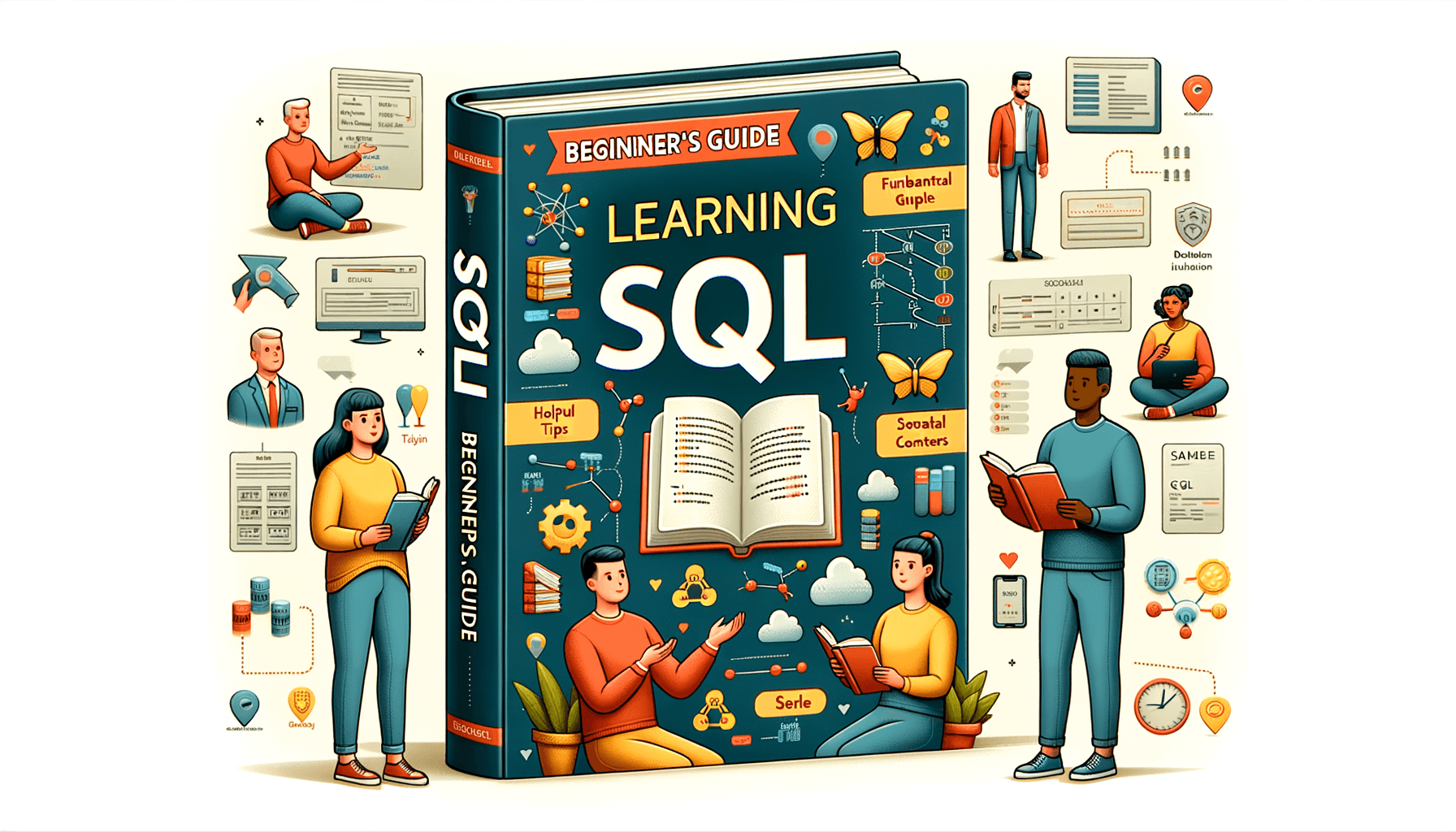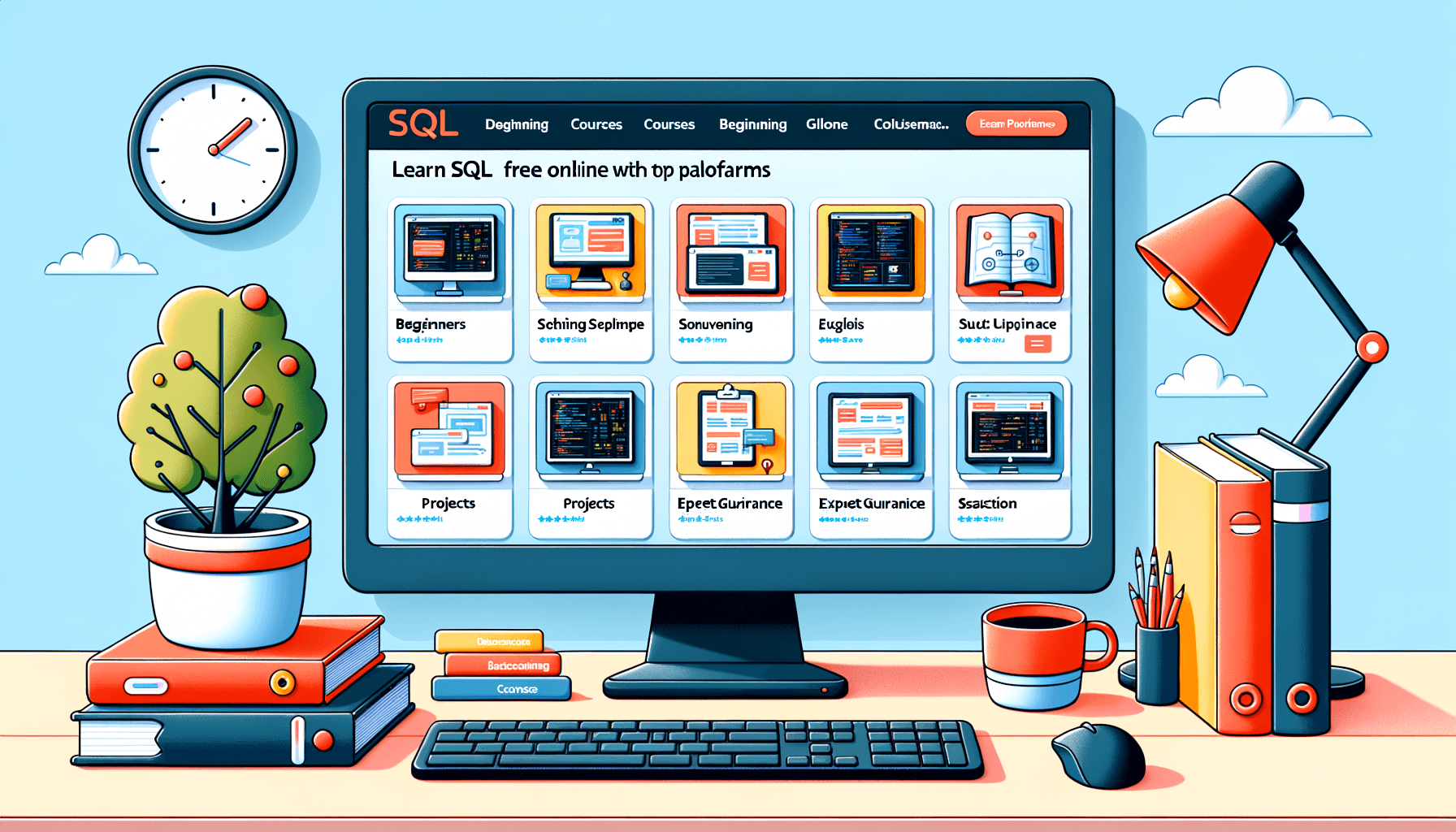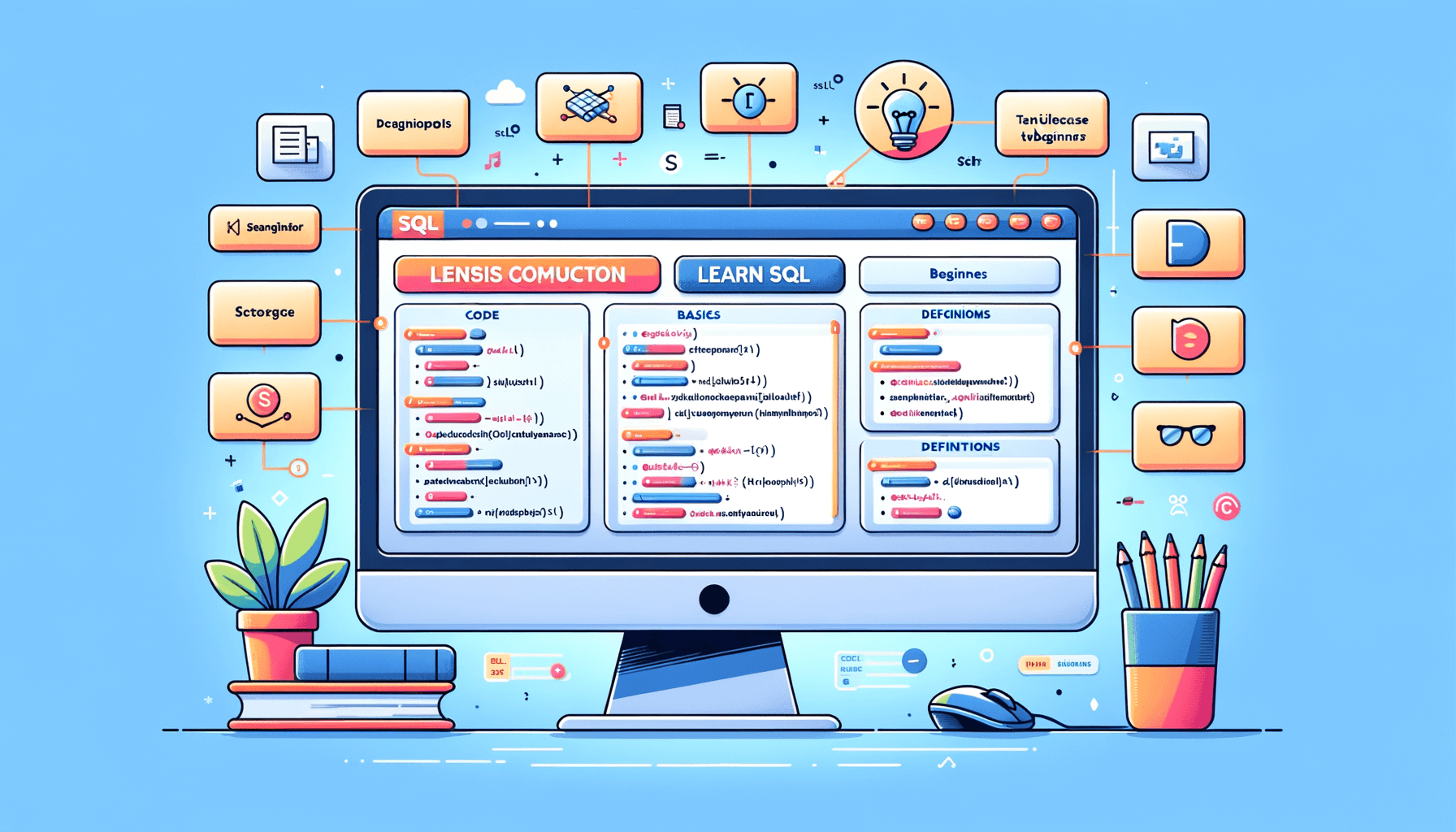A big variety of articles and resources

Master Data Management with Our Learn SQL Course
 Sia Author and Instructor
Learn SQL
Sia Author and Instructor
Learn SQL
10 minute read
Understanding Master Data Management in SQL
Master Data Management (MDM) is a critical aspect of modern data management strategies. It involves the creation, management, and maintenance of an organization's critical data to ensure consistency and accuracy across the enterprise. Unlocking data science potential often begins with mastering MDM principles, especially when leveraging SQL.
The Role of SQL in Data Management
SQL plays a pivotal role in MDM by providing the tools necessary to query, update, and manage master data. It enables organizations to maintain a single source of truth, which is essential for accurate reporting and decision-making. SQL's robust querying capabilities make it an indispensable tool for data professionals.
Key Concepts of Master Data Management
Master Data Management encompasses several key concepts, including data integration, data quality, and data governance. These concepts ensure that data is accurate, consistent, and accessible across the organization. By understanding these principles, data professionals can effectively manage and utilize master data.
Benefits of Master Data Management
Implementing MDM offers numerous benefits, such as improved data quality, enhanced decision-making, and increased operational efficiency. Organizations can achieve a competitive edge by ensuring their data is reliable and up-to-date. Additionally, MDM helps in navigating resources and leveraging data for strategic initiatives.
Master Data Management is not just about technology; it's about creating a culture of data excellence within an organization. By focusing on data quality and governance, businesses can unlock the full potential of their data assets.
Core Skills You Will Gain from Our Learn SQL Course
Our Learn SQL Course is designed to equip you with essential skills for effective data management and analysis. Master SQL with LearnSQL: The Ultimate Guide offers a comprehensive curriculum, expert-led courses, practical exercises, and personalized support to ensure you become proficient in SQL.
Writing Basic SQL Queries
In this course, you'll learn how to write basic SQL queries to interact with databases. This foundational skill is crucial for anyone looking to work with data, whether in data science, analytics, or engineering.
Combining Data from Multiple Tables
You'll also gain the ability to combine data from multiple tables using various SQL techniques. This skill is essential for creating complex datasets and performing in-depth analyses.
Generating Automated Summary Reports
Finally, the course will teach you how to generate automated summary reports. This capability is invaluable for making informed strategy, operations, and business decisions.
Build your SQL skills with interactive courses, tracks, and projects curated by real-world experts.
Implementing SQL Server Master Data Services
Setting Up SQL Server Master Data Services
Setting up SQL Server Master Data Services (MDS) involves several steps to ensure a smooth implementation. First, you need to install and configure the MDS software on your server. This includes setting up the MDS database and configuring the web application. Once the installation is complete, you can start creating your master data models and entities.
Data Modeling and Integration
Data modeling in MDS is crucial for defining the structure of your master data. You can create models that represent different business entities and define relationships between them. Integration with other systems is also essential. MDS allows you to integrate enterprise data with Master Data Services for effective data management. This integration ensures that your master data is consistent and up-to-date across all systems.
Ensuring Data Quality
Ensuring data quality is a key aspect of Master Data Management. MDS provides tools for data validation, cleansing, and enrichment. You can set up business rules to enforce data quality standards and use data stewards to manage and monitor data quality. By maintaining high data quality, you can improve the accuracy and reliability of your business intelligence and analytics.
Implementing SQL Server Master Data Services can significantly enhance your data management capabilities, making it easier to maintain consistent and accurate master data across your organization.
Advanced Techniques in SQL for Data Management
Data Cleaning and Modification
Data cleaning and modification are essential for maintaining the integrity of your database. Mastering data structures is crucial for effective data cleaning. This involves removing duplicates, correcting errors, and ensuring consistency across the dataset. Advanced SQL techniques, such as using stored procedures and complex data types, can significantly streamline these processes.
Constructing a SQL Database
Constructing a SQL database involves several steps, from designing the schema to implementing the database. Key considerations include data normalization, indexing, and setting up relationships between tables. Online tutorials, software tools, and platforms can enhance your skills in this area. Here are some steps to get you started:
- Design the database schema.
- Normalize the data.
- Create tables and define relationships.
- Implement indexing for faster query performance.
- Test the database with sample data.
Advanced Query Writing
Advanced query writing allows you to extract more meaningful insights from your data. This includes writing complex joins, subqueries, and using window functions. Understanding common challenges in SQL data modeling can help you write more efficient queries. Here are some advanced techniques to consider:
- Using CTEs (Common Table Expressions) for better readability.
- Implementing window functions for advanced analytics.
- Writing dynamic SQL for flexible query generation.
Advanced SQL techniques are essential for anyone looking to excel in data management. They not only improve the efficiency of your queries but also enhance the overall quality of your data.
Career Opportunities with Master Data Management Skills
Roles for Data Modelers and Architects
Master Data Management (MDM) skills open up specialized career paths for professionals. Data Modelers and Data Architects are in high demand as organizations seek to enhance backend development skills with SQL. These roles involve designing and managing data models that ensure data integrity and consistency across the enterprise.
Attracting Recruiters with SQL Skills
After learning this course, you can add Master Data Services to your skills and attract recruiters to consider you for the job of a Data Modeler or Data Architect. The specialized knowledge in MDM makes you a valuable asset in the job market, increasing your chances of landing high-profile roles.
Real-World Applications of SQL in Business
MDM skills are not just theoretical; they have practical applications in various industries. From healthcare to finance, businesses rely on SQL for data management, ensuring data quality, and generating insights. This course equips you with the skills to implement MDM solutions, making you indispensable in any data-driven organization.
Master Data Management is a niche area that offers long-term benefits and career advantages. Investing in these skills can significantly boost your professional growth and job satisfaction.
Course Requirements and Prerequisites
Who Should Take This Course
This course is designed for anyone looking to enhance their data management skills, whether you're a beginner or an experienced professional. No prerequisites are required, making it accessible to a wide audience.
Technical Requirements
To get the most out of this course, you will need a computer with internet access. The course is delivered entirely online, so you can learn at your own pace. Here are the technical requirements:
- A computer with at least 4GB of RAM
- Stable internet connection
- A modern web browser (Chrome, Firefox, Safari)
Preparing for the Course
Before starting, it's beneficial to have a basic understanding of data concepts. While there are no formal prerequisites, completing the following courses can provide a solid foundation:
- Exploring Data
- Integrating Data From Multiple Tables
- Extracting Insights From Data
- Fundamentals of Database Design
Practice SQL online for free to get a head start. This will help you become familiar with the SQL environment and basic commands.
Exploring Additional Resources and Courses
Advanced SQL Courses to Consider
To further enhance your SQL skills, consider exploring advanced courses that delve deeper into complex queries, performance tuning, and database optimization. Enhance SQL skills with resources like books, online courses, and community forums. These courses are designed to provide a comprehensive understanding of advanced SQL concepts and techniques.
Integrating SQL with Other Technologies
SQL is a versatile language that can be integrated with various technologies such as Python, R, and big data platforms. Learning how to combine SQL with these technologies can open up new opportunities for data analysis and management. Dive into learning opportunities for career growth by exploring courses that focus on these integrations.
Continuous Learning in Data Management
The field of data management is constantly evolving, and continuous learning is essential to stay updated with the latest trends and technologies. Consider subscribing to industry newsletters, joining professional organizations, and participating in webinars and workshops to keep your skills current. This approach will ensure you remain competitive in the job market and can adapt to new challenges in the field.
Continuous learning is the key to long-term success in data management. Stay curious and proactive in seeking out new knowledge and skills.
Exploring additional resources and courses can significantly enhance your learning journey. Our website offers a comprehensive course catalogue designed to improve your technical knowledge and career prospects. Don't miss out on the opportunity to advance your skills with the support of our expert team and AI-assisted learning modules. Visit our website today to find the perfect course for you and start achieving your goals!
Conclusion
Master Data Management is a critical skill in today's data-driven world, and our Learn SQL course is designed to equip you with the necessary tools and knowledge to excel in this field. By mastering SQL, you will be able to manage large datasets, integrate enterprise data, and generate insightful reports that can drive business decisions. Whether you are a beginner or looking to enhance your data management skills, this course offers comprehensive training that covers everything from basic queries to advanced data modeling and integration techniques. With practical exercises, real-world examples, and expert guidance, you will be well-prepared to tackle complex data challenges and advance your career in data management. Enroll today and take the first step towards becoming a proficient data manager.
Frequently Asked Questions
What is Master Data Management (MDM)?
Master Data Management (MDM) is a comprehensive method of enabling an organization to link all of its critical data to a common point of reference. It helps improve data quality and consistency across the organization.
What role does SQL play in Master Data Management?
SQL plays a crucial role in Master Data Management by providing the tools needed to query, manipulate, and manage large datasets. It allows for the integration and cleansing of data from multiple sources.
What are the prerequisites for taking the Learn SQL course?
There are no specific prerequisites for taking the Learn SQL course. However, a basic understanding of databases and data management concepts can be helpful.
What skills will I gain from the Learn SQL course?
You will gain skills in writing basic SQL queries, combining data from multiple tables, generating automated summary reports, and constructing a SQL database. These skills are essential for effective data management.
How can Master Data Management skills benefit my career?
Master Data Management skills can open up career opportunities in roles such as Data Modeler, Data Architect, and Data Quality Analyst. These skills are highly valued in industries that rely on accurate and consistent data.
Are there any advanced SQL courses available after completing the Learn SQL course?
Yes, there are several advanced SQL courses available, such as Manipulating Data with SQL, Scripting with Python and SQL for Data Engineering, and Performing Data Aggregation Using SQL Aggregate Functions. These courses can help you further enhance your SQL skills.
Related Articles

Is It Easy to Learn SQL? A Beginner's Guide to Mastering SQL
10 minute read

Learn SQL Free Online: Your Path to Data Mastery
9 minute read

Learn SQL Language Free: A Comprehensive Tutorial
8 minute read


